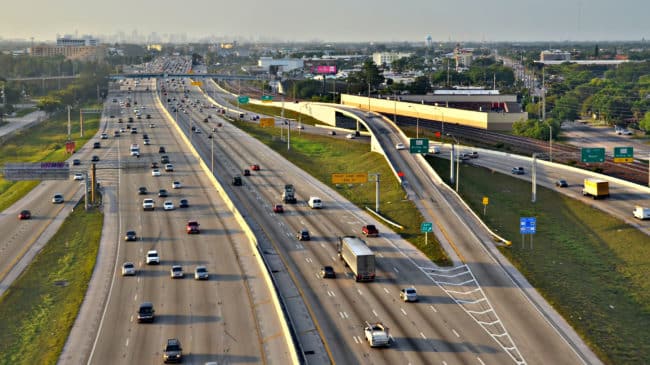Florida’s legislature and governor have embraced contradictory policies toward toll-financed improvements to the state’s highway system. Both Republican Gov. Ron DeSantis and the GOP-majority state legislature are promoting three new north-south toll roads, while that same majority has enacted a series of anti-toll measures over the past five years. And the financial markets have noticed.
As one of America’s fastest-growing states, but also with a low-tax business climate to preserve, Florida has relied on toll financing to supplement what it could afford to build with traditional gas taxes. Today, 33 Florida counties have toll facilities, amounting to over 3,500 lane-miles. Motorists travel over 16 billion miles on them each year. Key portions of the expressway systems in the Miami, Orlando, and Tampa would not have been possible without toll financing. And the same pattern is now being repeated in Jacksonville.
But a populist anti-toll movement emerged about a decade ago in Miami. It was triggered when the Miami-Dade Expressway Authority (MDX) switched from cash tolls to all-electronic tolling. One result was that for the first time, all drivers who used its tollways had to pay, whereas previously about half were able to avoid toll booths. Anti-toll agitators found legislative champions, who in recent years have enacted at least one restriction on tolling in every legislative session.
Last year they took their boldest step: passing a measure to abolish well-run Miami expressway agency MDX, replacing it with a state agency whose tolling ability would be cut back, and which would likely not be able to issue any new bonds, including for an already-approved extension of MDX’s busiest tollway.
To the surprise of many observers, pro-tolls Gov. Ron DeSantis signed the bill—and when it was challenged in court, ordered the Florida Department of Transportation to defend it (in an appeal that is still under way).
Needless to say, the bond rating agencies are alarmed by these ever-bolder legislative assaults on tolling. Since the anti-MDX bill was signed last year, the three major rating agencies have posted six ratings downgrades of MDX bonds. In its most-recent downgrade (Feb. 20), Fitch Ratings cited “the acute level of political interference into the agency’s governance and rate-setting.”
As Shelly Sigo reported in Bond Buyer:
The uncertainty over MDX’s governance and “the ambiguity in regards to strategic direction and oversight during the course of the potentially lengthy legal proceedings,” led Fitch Ratings to downgrade MDX’s bond rating Feb. 20.
Fitch cut the rating on MDX’s $1.43 billion of outstanding revenue bonds to BBB-plus from A-minus due to the lack of clarity regarding the legal outcome and management of the expressway authority, which currently doesn’t have a board of directors.
“While a hearing on the writ of prohibition is scheduled for March 10, continued legal proceedings are expected and may be prolonged,” said Fitch analyst Stacey Mawson. “There is also the possibility that the outcome of the March hearing may leave the authority without a board through fiscal year end,” and MDX may be unable to execute or enter into contracts.
“The rating also takes into account the acute level of political interference into the authority’s governance and rate-setting, along with the potential for a weakened pricing framework due to House Bill 385, which places a prolonged moratorium on rate increases,” she said, adding there also is uncertainty around the authority’s capital planning and investment strategy in the wake of the legislation and legal proceedings.
The political and legal battles enveloping the MDX since HB 385 was signed have resulted in six downgrades, including Fitch’s initial rating cut to A-minus from A on May 8, 2019, five days after lawmakers passed SB 385.
Moody’s Investors Service lowered its ratings to A3 from A2 on July 5, and to A2 from A1 on May 10. S&P Global Ratings cut its rating to A from A-plus on July 16.
The rating actions cited the state’s political interference in the operation of what had been an agency with independent rate-setting authority. All ratings have negative outlooks.
Majority legislative support for the series of anti-toll measures has been excused by their portrayal as “local issues” of concern only to Miami-Dade legislators. Legislative courtesy generally leads to support for measures that supposedly have only local impact. But if the legislature today can attack and undermine successful toll entities in Miami, who’s to say what a future legislature might do to toll projects elsewhere in the state—including the three new toll road embraced by the governor and a majority of the legislators.
Last year, while approving the bill to kill the Miami toll agency, the same legislative majority also passed the bill to authorize three new north-south toll roads, with strong support from the Florida Chamber of Commerce and most of the business community. If those multi-billion-dollar projects are to be financed via toll revenue bonds, legislators and the business community must face up to the fact that Florida is increasingly being viewed as a higher-risk state for toll financing.
Hacking away at tolling is also very short-sighted. Fuel tax revenues, in Florida and everywhere else, have begun what will be a long-term decline, as more fuel-efficient cars continue to replace aging gas-guzzlers and as electric vehicles become a larger and larger portion of the vehicle fleet. Florida is going to need more tolled corridors, not fewer, to cope with this inevitable change.
Legislative leaders and the governor need to understand that Florida is increasingly at risk of being red-lined as a high-risk state for toll financing. To undo the damage to the state’s financing reputation, the case defending the abolition of MDX should be dropped, and the whole set of anti-toll measures from recent years should be repealed. They threaten planned express toll lanes networks in all four metro areas, planned expansion of the urban toll road systems, and planned improvements to Florida’s Turnpike—as well as the three new toll roads the business community wants.

